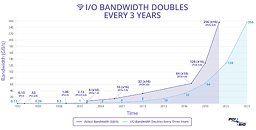- Joined
- Oct 9, 2007
- Messages
- 47,880 (7.38/day)
- Location
- Dublin, Ireland
| System Name | RBMK-1000 |
|---|---|
| Processor | AMD Ryzen 7 5700G |
| Motherboard | Gigabyte B550 AORUS Elite V2 |
| Cooling | DeepCool Gammax L240 V2 |
| Memory | 2x 16GB DDR4-3200 |
| Video Card(s) | Galax RTX 4070 Ti EX |
| Storage | Samsung 990 1TB |
| Display(s) | BenQ 1440p 60 Hz 27-inch |
| Case | Corsair Carbide 100R |
| Audio Device(s) | ASUS SupremeFX S1220A |
| Power Supply | Cooler Master MWE Gold 650W |
| Mouse | ASUS ROG Strix Impact |
| Keyboard | Gamdias Hermes E2 |
| Software | Windows 11 Pro |
With 64 Gbps bandwidth per lane, 256 Gbps in x4, and a whopping 1 Tbps in x16 (128 GB/s per direction), PCI-Express 6.0 will debut in 2021 as 5G adoption hits critical mass in markets across the globe, to support server nodes, high-bandwidth network infrastructure, and lighting fast I/O for HPC and AI applications. Development of the new standard is already underway, with the specification having achieved a pre-release version 0.3, according to the PCI-SIG, the body that develops and maintains the PCI IP.
Further development, prototyping, and testing of the standard will run through 2020 as drafts of the standard are dispatched to interested parties. With the specification published in 2021, the first devices implementing it could arrive the following year. Granted, very few devices need 1 Tbps bandwidth, but the exercise of doubling bandwidth every 3 or so years has its maximum impact on devices that only have wiring for one PCIe lane, and directly impacts bandwidth of other I/O specifications that are derived from PCIe, such as USB, Thunderbolt, CXL, etc.

View at TechPowerUp Main Site
Further development, prototyping, and testing of the standard will run through 2020 as drafts of the standard are dispatched to interested parties. With the specification published in 2021, the first devices implementing it could arrive the following year. Granted, very few devices need 1 Tbps bandwidth, but the exercise of doubling bandwidth every 3 or so years has its maximum impact on devices that only have wiring for one PCIe lane, and directly impacts bandwidth of other I/O specifications that are derived from PCIe, such as USB, Thunderbolt, CXL, etc.

View at TechPowerUp Main Site












